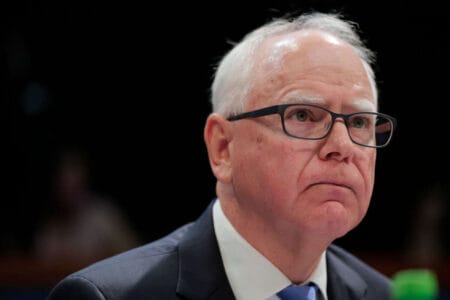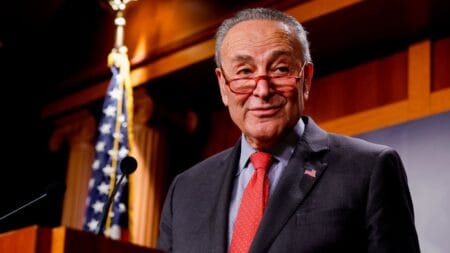The United States and China have sharply raised tariffs on each other’s imports over the last week, raising the prospect of a long and painful trade war between the world’s two largest economies.
Even as investors rallied to his decision to pause “reciprocal” tariffs on imports from dozens of countries Wednesday, President Donald Trump raised tariffs on Chinese goods to 145 percent — an increase of nearly 50 percent in a day, and his fourth tariff action against Beijing since January. President Xi Jinping has not backed down, either, retaliating by raising China’s tariffs on U.S.-made goods to 84 percent and imposing new curbs on critical resources. (Trump on Wednesday said the tariff rate on China would be 125 percent, but a White House official, speaking on the condition of anonymity to explain government policy, said Thursday the actual rate would be 145 percent.)
The intensifying financial hostilities represent a potentially significant threat to the United States and global economies regardless of the delay in higher tariffs for other trading partners. Government officials in Beijing and Washington have, for years, girded for a major clash between the two superpowers, and some economists say further escalation could do perhaps as much to push the U.S. into a recession as Trump’s initial tariff proposal would have.
Treasury Secretary Scott Bessent said Wednesday morning that “everything is on the table” to respond to China, and lawmakers in Congress have begun pushing measures designed to increase financial pressure on Beijing.
The two nations have become increasingly interlinked over the past several decades, with Americans dependent on cheap consumer imports and Chinese exporters reliant on the vast U.S. market. The trade ties include iPhones (made in China), soybeans (grown in the United States) and financial instruments that form the bedrock of the U.S. financial system. The consequences of an all-out trade war would be global; combined, the two countries account for more than 40 percent of the world economy.
China accounts for about 14 percent of U.S. imports, and the tariffs on Chinese goods are now so high that the overall U.S. tariff rate rose slightly Wednesday even though Trump simultaneously lowered duties on many other countries, according to Ernie Tedeschi, a former Biden administration official now at Yale University’s Budget Lab.
“Everyone is breathing a sigh of relief today, but if we’d just started with just 100-plus percent tariffs with the world’s two largest economies, we’d be saying we’re in a global trade war the likes of which we have not seen in decades‚” said Josh Lipsky, senior director of the Atlantic Council’s GeoEconomics Center. “If these tariffs were to stay on at this level … the recession risks are still high, in part because there’s still so much uncertainty.”
Jason Furman, a Harvard University economist who served in the Obama administration, said Trump’s tariffs are “now higher and more inflationary” than they were when the president unveiled major trade measures on April 2.
There are indications that de-escalation remains possible. On Wednesday, Trump appeared to express sympathy for the Chinese position, saying that Xi wanted to reach an agreement but that Beijing was not sure how to do so. The president said he was optimistic further escalation would not prove necessary and called Xi “a friend of mine” who understood how to reach a deal.
“China wants to make a deal. They just don’t know how quite to go about it,” Trump told reporters. “They don’t know quite how to go about it, but they’ll figure it out.”
Later in the day, he said he did not think higher tariffs on China would be necessary: “I don’t think we’ll have to do it more.”
Beijing had not retaliated by Thursday afternoon local time. “We will not sit and watch the destruction of international trade rules,” said Lin Jian, a spokesman for the Foreign Affairs Ministry. “If the U.S. insists on launching a tariff or trade war, China will fight to the end.”
Other experts warn that it’s possible both leaders would be unable to soothe the tensions inflamed by a rapid set of new trade barriers. And many officials influential with the Trump administration are pushing measures that could deepen, rather than calm, economic hostilities. Economists and policymakers in both parties have long accused China of unfair trade practices, such as stealing U.S. intellectual property and undercutting labor and environmental standards.
Sen. Rick Scott (R-Florida), a close Trump ally, has pushed legislation to require stockbrokers to provide warning labels for investors on firms linked to Chinese entities. While in the Senate, Secretary of State Marco Rubio also pushed significant restrictions preventing Chinese firms from accessing U.S. capital markets, blocking them or their subsidies from U.S. exchanges. Investor Kevin O’Leary, who has spoken with Trump, has called for tariffs of 400 percent on China.
“There’s not a high enough tariff for me. I don’t think we should buy anything from China,” Scott said in an interview. He added, of the Trump administration: “I think they get it — they understand that China wants to destroy us, destroy our allies, destroy our way of life.”
Top Trump advisers such as Bessent and Stephen Miran, the chair of the White House Council of Economic Advisers, have said they believe China is in a much more vulnerable position than the U.S. That has suggested their willingness to push even greater punitive measures, perhaps beyond import duties.
“We might end up with escalation that goes beyond tariffs,” said Eswar Prasad, a Cornell University professor who was previously chief of the financial services division at the International Monetary Fund. “As of today, many of the scenarios considered completely unrealistic are looking more likely.”
Beijing has tools for further retaliation. China could move faster to shed its large U.S. Treasury holdings, which would drive up the price of issuing debt and disrupt the bond market. It could choose to target the U.S. housing market by selling hundreds of billions in mortgage-backed securities, which could push rates up. Other options include restricting pharmaceutical exports, semiconductor chips, critical minerals and other resources essential to the U.S. economy, said Adam Posen, president of the Peterson Institute for International Economics, a centrist think tank.
“They can create shortages of things we really need and can’t switch away from anytime soon,” Posen said.
Posen also said China could cut off tourism to U.S. cities.
“Essentially, China does not have to engage in the tariffs game with Trump,” he said. “They can deprive us of things we need directly either for households or for our everyday lives.”
China cannot back down in the face of what amounts to an attack on Chinese manufacturing, said Wang Yiwei, an international relations scholar at Renmin University in Beijing.
“When no common ground exists between ‘the great rejuvenation of the Chinese nation’ and ‘make America great again,’ decoupling becomes the underlying reality and tensions will only escalate,” Wang said, referring to a favored slogan of Xi’s and Trump’s slogan.
Yet Trump may not be seeking more confrontation. Hawkish voices in the administration believe China is weak and that the U.S. should take advantage of this opportunity to increase financial pressure, according Michael Pillsbury, a leading scholar on China at the Heritage Foundation, a right-leaning think tank. But Pillsbury said Trump’s comments suggest a desire to bring down the temperature.
“The super-hawks are saying, ‘China is down now; we really have to finish this off.’ I oppose that approach,” Pillsbury said. “Trump is right: The Chinese don’t know exactly how to get out of this situation. We need to find a back-channel way to help them see what they should do next.”







